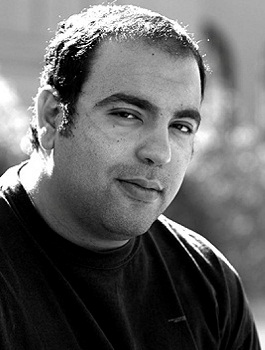The definition of ‘Mirage’:
1. An optical illusion caused by atmospheric conditions.
2. Something that appears real or possible but is not.
I have been looking for days for a proper word to describe the state of Egypt right now, given that we have a huge centralised government, an elected president, and parties that all seem to be failing to do what we perceive to be their jobs. However, the political terms in existence have failed to create a term that effectively portrays the state we are in right now.
Some people have used terms such as failed state, or a broken state, but neither of those effectively portrays the very unique condition that the country is going through right now. So I made up my own term, to be added to the never ending heap of bullshit political terminology: The Mirage State. Ladies and Gentlemen, congratulations: you are living in a mirage state.
A mirage state is a country where things have the appearance of something real, but don’t actually exist or function in the same way to the real thing it mimics. It’s not a complete mirage, because a lot of it is tangible, but in reality, it’s just an apparition of what it should be. It’s like a case of collective delusion where we insist that oranges are actually apples, and get really mad if anyone questions that notion to be factually true. Unfortunately, this holds true to everything about our lives here.
Technically we believe Egypt to be a functioning state: it has institutions, democracy, elections, laws, economy, judiciary, police, a military, parties, political activists, a prime minister and a president. Unfortunately, while it seems like we have all the trappings of a country and a state; it’s more like an optical illusion.
None of it is the real thing. We have institutions that have employees and budgets and paper work, but almost nonexistent output; we have a democracy, but that is only in so far as we have elections; we have elections where the voters vote for the symbol but have no clue who they are voting for or what the candidate’s policies or history is; we have laws that don’t get enforced unless there is a political will behind it; a judiciary that are above reproach or accountability despite their inefficiency and corruption; hundreds of thousands of police officers and soldiers with uniforms but no security; a military with a huge budget and millions of soldiers and guns but can’t protect our borders; parties that compete in elections without having actual real policies, politicians or institutional structure; political activists who propose textbook solutions that would never work realistically; an economy that operates completely separately from government policies, the current state of the country and the international economy; a prime minister whose qualifications for being the most important prime minister in the history of Egypt is having a beard, and a president who we see in pictures, but don’t actually see doing anything. The Mirage State.
The problem isn’t that the revolution created this Mirage State, but rather that it has always existed from the days of Mubarak, which we always suspected but never believed, because things used to function due to informal structure that we created without noticing. The state used to function based on a network of connections; the economy used to and still functions based on an informal sector that no one can either measure or penetrate; the policing used to be carried out away from the law or true investigative work and more reliant on torture and jailing; politics used to be the domain of one party that would insist that it believes in democratic transition and values while always rigging elections; and the president used to do anything he wanted in the country no matter what the constitution or the laws stated.
It was a mirage of a system, but we saw it and therefore believed it existed and functioned, and knew how to work around it informally. At least, that is, until the day the revolution came and stripped away the illusions one by one, and people were horrified at the state that they were in. Some of them saw it as a chance to try to fix the system, while others blamed the revolution when the system failed to continue functioning. The illusion was so strong that they thought it was real even after it was destroyed. Either way, both lamented the condition we were in, and continue to be horrified at how nothing has been done to mend the situation, completely oblivious to the fact that it was the informal state that made everything work and that continues to operate ‘til this day.
And therein lies the rub: while the revolution cannot be blamed for the Mirage State, it can be blamed for electing a president who wants it to continue to exist, and continues to take decisions and policies that have the appearance of solutions but don’t actually solve anything. Let’s ignore the decision to bring back parliament for a second, and take a look at his latest initiative to solve the trash problem.
President Morsy’s initiative can be summed up in five words: “People, pick up your trash”. That’s it. Instead of resolving the issues that exist between the governorates and the trash collection companies, or using the help of the zabaleen community, who have been doing a remarkable job of being the informal trash collectors of Egypt, President Morsy asked the people to simply resolve the trash problem by picking up the trash. Fine, but take it where? No answer. Would that mean that we no longer have to pay the trash collection money added to our electricity bill, since we are the ones collecting the trash? No answer. Is this part of maybe some sweeping recycling initiative, where we create a huge recycling industry and quite possibly create hundreds of thousands of jobs in the process? Nope. The plan is simply to pick up the trash and for Egyptians to engage in their civic duty in collecting trash that they pay to be collected for them in order to… eh… nothing.
That’s our president addressing the problem, and it’s our duty to apparently support him. His solution to the power outages isn’t an initiative to build new power plants or privatise the energy industry, but for the citizens to shut off their electricity for two hours a day, because that would solve it. It would be depressing if it wasn’t so comical. I personally await his solution for the frequent breakdown of the sewage system by asking the citizens to hold it in as long as possible. It’s insane.
What’s so depressing about all of this is that people recognise that they do live in a mirage state, and don’t want to live like that anymore. They would actually like to have a real state, and are willing to wait the long years that institutional reform would take if they just sensed that there was a real and coherent plan that can be implemented. Yet no one is answering their prayers. The good news is that the first step in ending the Mirage State is to recognise it for what it is and demand it to be changed, which didn’t use to happen before, but is happening now. The people of the Mirage State of Egypt have just stopped being that, and started to become actual citizens. Hopefully the rest of the state will follow suit.





